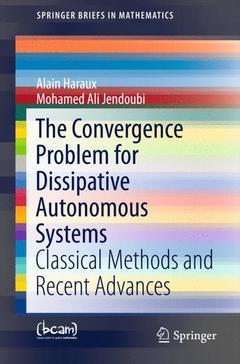The Convergence Problem for Dissipative Autonomous Systems, 1st ed. 2015 Classical Methods and Recent Advances SpringerBriefs in Mathematics Series
Auteurs : Haraux Alain, Jendoubi Mohamed Ali

The book investigates classical and more recent methods of study for the asymptotic behavior of dissipative continuous dynamical systems with applications to ordinary and partial differential equations, the main question being convergence (or not) of the solutions to an equilibrium. After reviewing the basic concepts of topological dynamics and the definition of gradient-like systems on a metric space, the authors present a comprehensive exposition of stability theory relying on the so-called linearization method. For the convergence problem itself, when the set of equilibria is infinite, the only general results that do not require very special features of the non-linearities are presently consequences of a gradient inequality discovered by S. Lojasiewicz. The application of this inequality jointly with the so-called Liapunov-Schmidt reduction requires a rigorous exposition of Semi-Fredholm operator theory and the theory of real analytic maps on infinite dimensional Banach spaces, which cannot be found anywhere in a readily applicable form. The applications covered in this short text are the simplest, but more complicated cases are mentioned in the final chapter, together with references to the corresponding specialized papers.
1 Introduction.- 2 Some basic tools.- 3 Background results on Evolution Equations.- 4 Uniformly damped linear semi-groups.- 5 Generalities on dynamical systems.- 6 The linearization method.- 7 Gradient-like systems.- 8 Liapunov’s second method - invariance principle.- 9 Some basic examples.- 10 The convergence problem in finite dimensions.- 11 The infinite dimensional case.- 12 Variants and additional results.
A rigorous and self-contained exposition of all the tools needed to develop the theory
A unified treatment of some results usually scattered in specialised research papers
A concrete approach to the important examples without ever sacrificing the beauty of the general theory behind them
Includes supplementary material: sn.pub/extras
Date de parution : 09-2015
Ouvrage de 142 p.
15.5x23.5 cm
Disponible chez l'éditeur (délai d'approvisionnement : 15 jours).
Prix indicatif 52,74 €
Ajouter au panier


